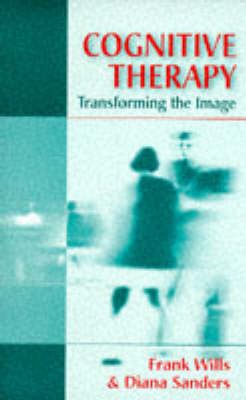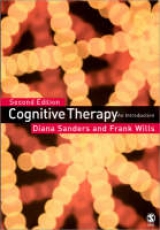
Cognitive Therapy
SAGE Publications Inc (Verlag)
978-0-7619-5083-7 (ISBN)
- Titel erscheint in neuer Auflage
- Artikel merken
Despite the massive changes that have transformed cognitive therapy in recent years, many counsellors still feel a lingering resistance to the cognitive model, seeing it as too rational and mechanistic in its methods. This accessible book challenges such negative views.
Frank Wills and Diana Sanders describe the original model and methods of cognitive therapy, then concentrate on the new wave of therapeutic creativity sweeping cognitive therapy, which is making an already effective approach even more applicable to a wide client group and range of issues and problems.
The authors show how both the theory and practice of cognitive therapy are enhanced by concepts more usually associated with other approaches - working with the emotions, with images and other non-verbal material, and with deeper core beliefs relating to early and other formative experiences. As cognitive therapy has developed, the therapeutic relationship has been brought centre stage, a move described in detail throughout the book. The authors describe how the new models of cognitive therapy can be fully integrated into counsellors′ working practice, providing examples throughout of the `new′ cognitive therapy in action.
Frank Wills is an Independent Cognitive Psychotherapist based in Bristol and also a tutor at the University of South Wales. He is co-author of Cognitive Therapy, Second Edition (SAGE, 2005) and Counselling for Anxiety Problems, Second Edition (SAGE, 2002). Diana Sanders is a counselling psychologist with the Oxfordshire Mental Healthcare NHS Trust and a research psychologist at Oxford University. Her publications include Coping with Periods (Chambers, 1985).
Introduction
Transforming the Image of Cognitive Therapy
PART ONE: A COGNITIVE MODEL FOR COUNSELLORS USING THE CASE CONCEPTUALIZATON APPROACH
The Original Model and Its Recent Developments
Case Conceptualization - At the Heart of Cognitive Therapy
The Therapeutic Relationship in Cognitive Therapy
PART TWO: APPLYING THE COGNITIVE THERAPY APPROACH TO COUNSELLING
Beginning, Engaging and Providing a Rationale
Tools and Techniques of Cognitive Therapy
Themes and Patterns in Cognitive Therapy
From Personality Disorders to Schemata
Difficulties in Cognitive Therapy
Ending Cognitive Therapy and Long-Term Coping
PART THREE: COGNITIVE THERAPY FOR COUNSELLORS
Cognitive Approaches and Counselling
| Erscheint lt. Verlag | 25.9.1997 |
|---|---|
| Verlagsort | Thousand Oaks |
| Sprache | englisch |
| Maße | 138 x 216 mm |
| Gewicht | 270 g |
| Themenwelt | Geisteswissenschaften ► Psychologie ► Allgemeine Psychologie |
| Geisteswissenschaften ► Psychologie ► Verhaltenstherapie | |
| Medizin / Pharmazie ► Medizinische Fachgebiete ► Psychiatrie / Psychotherapie | |
| Sozialwissenschaften ► Soziologie | |
| ISBN-10 | 0-7619-5083-4 / 0761950834 |
| ISBN-13 | 978-0-7619-5083-7 / 9780761950837 |
| Zustand | Neuware |
| Haben Sie eine Frage zum Produkt? |
aus dem Bereich



